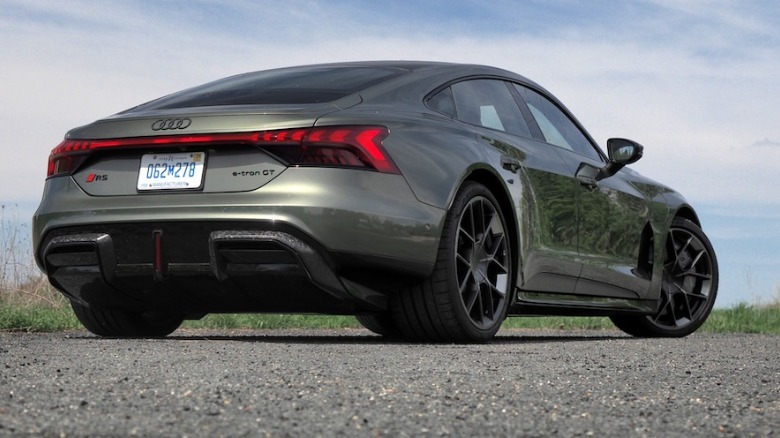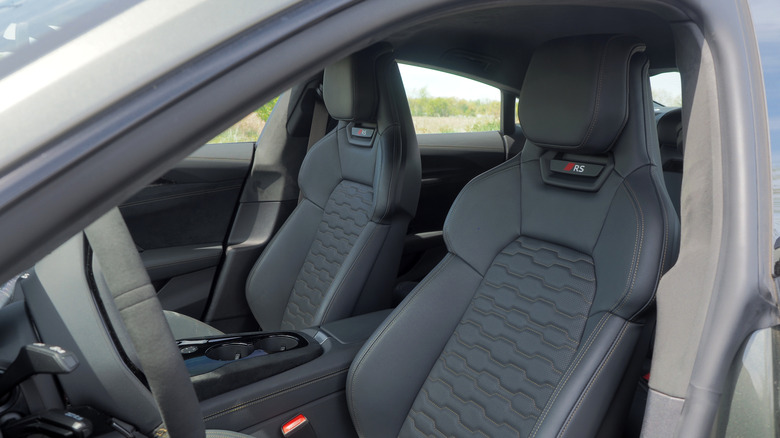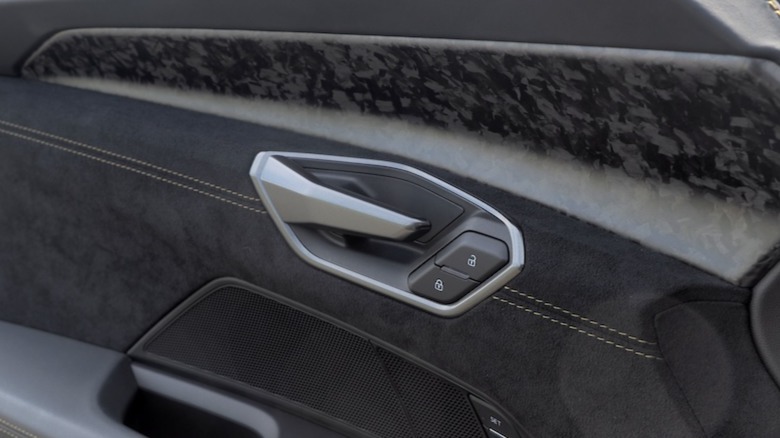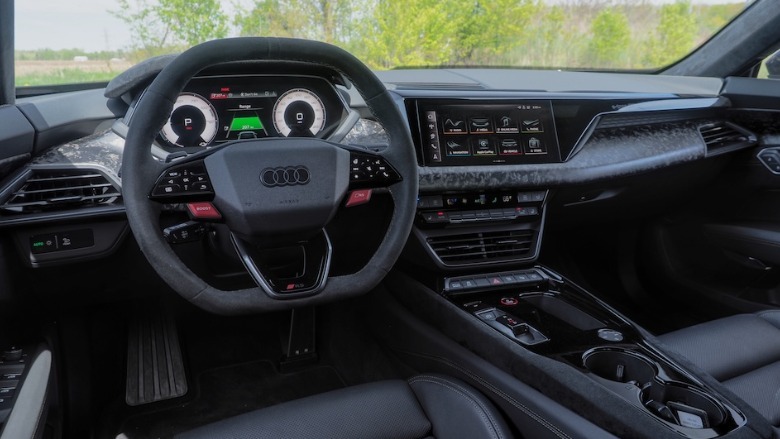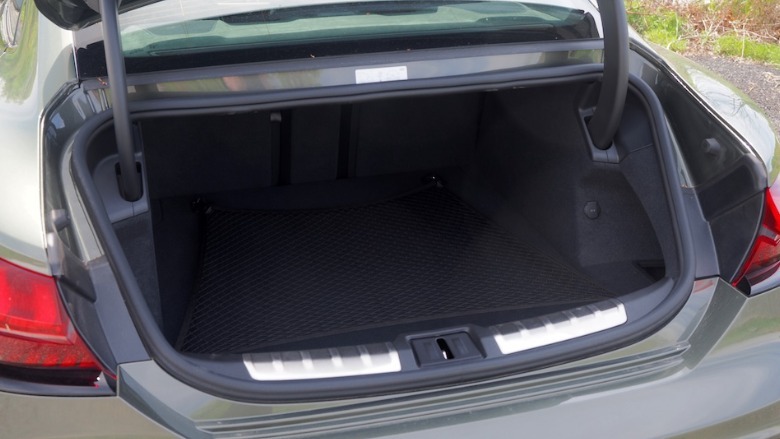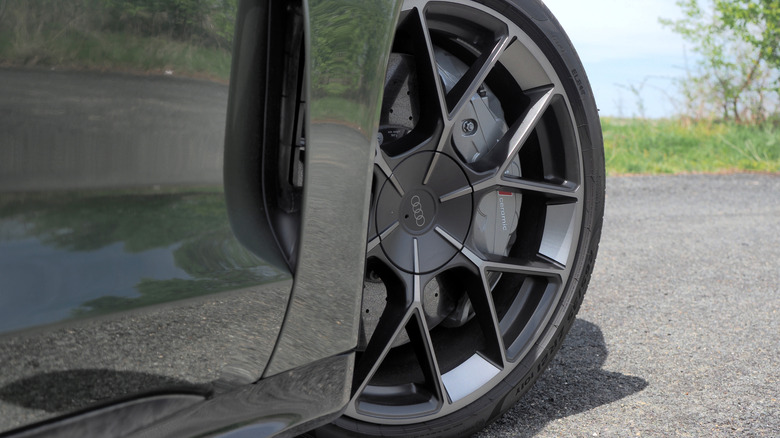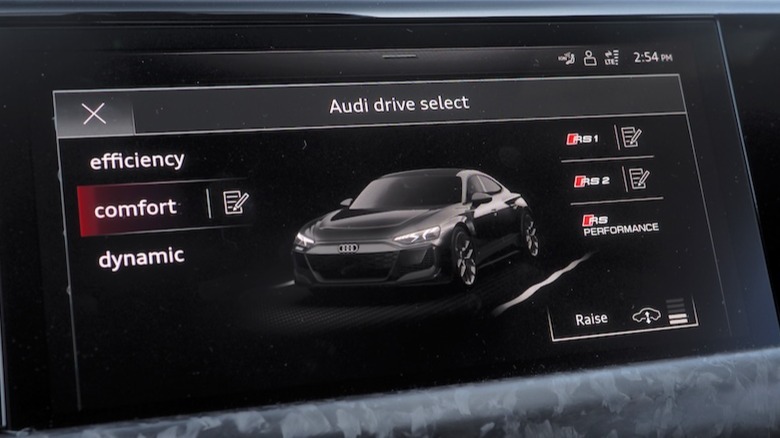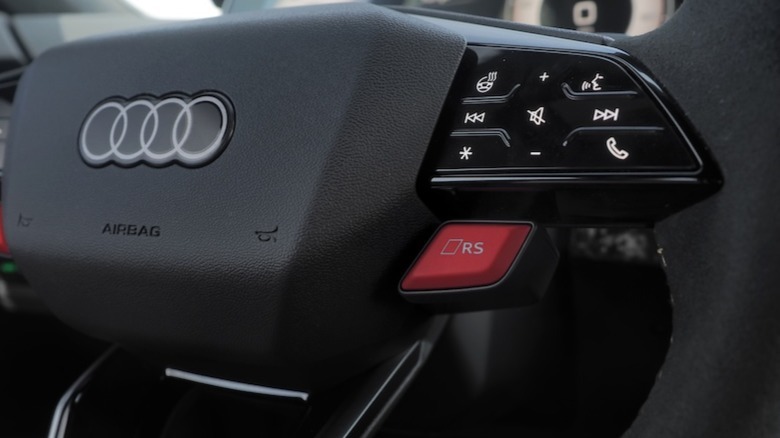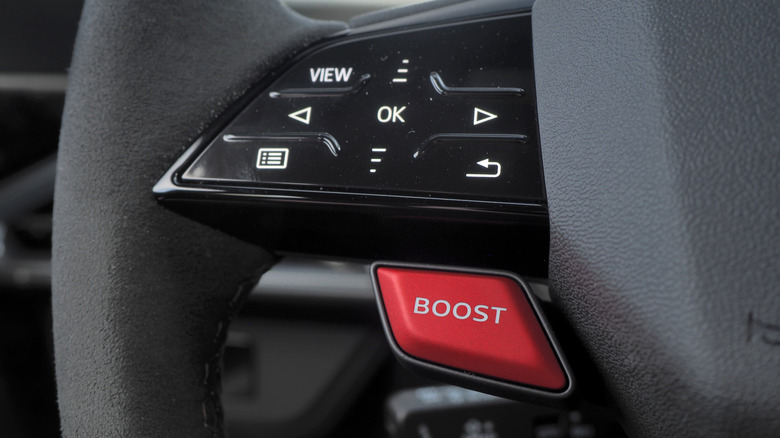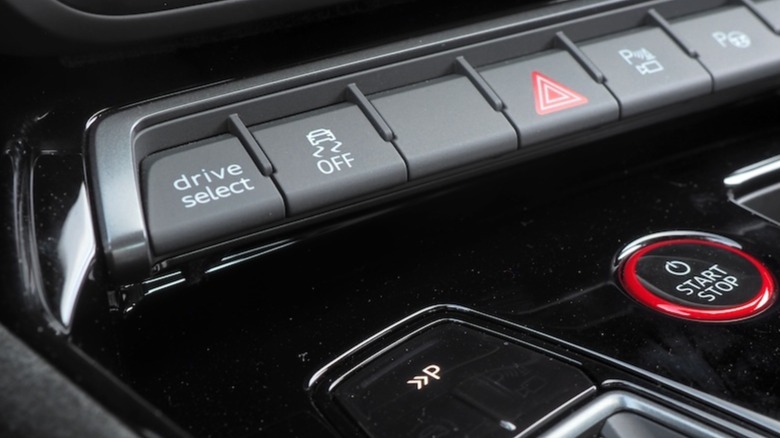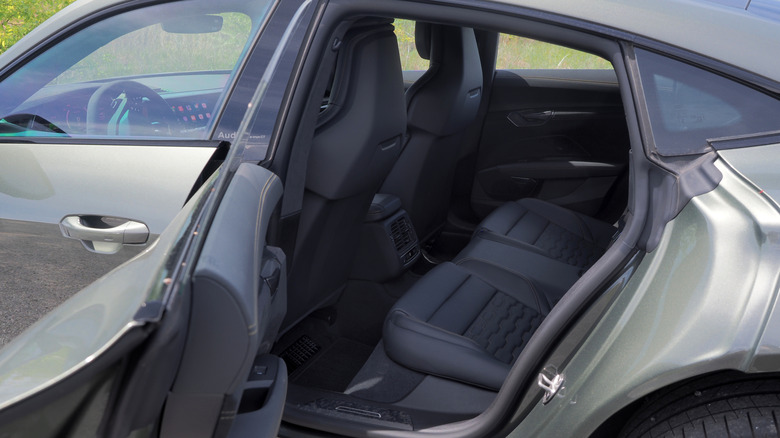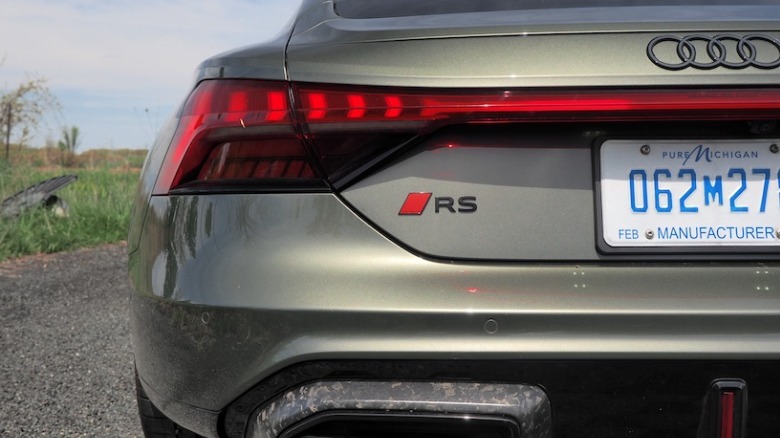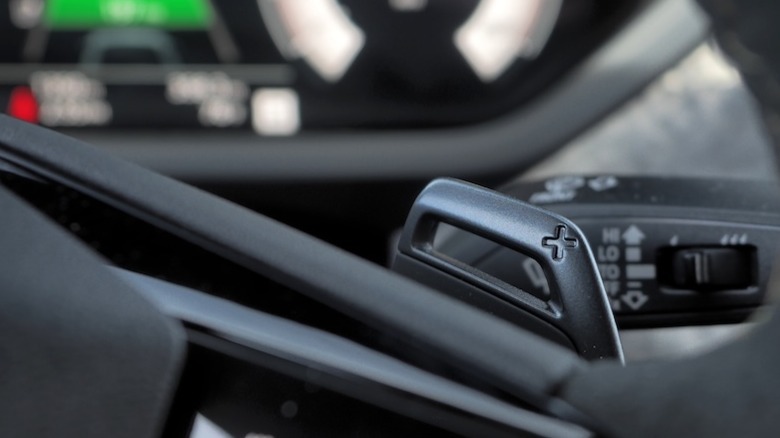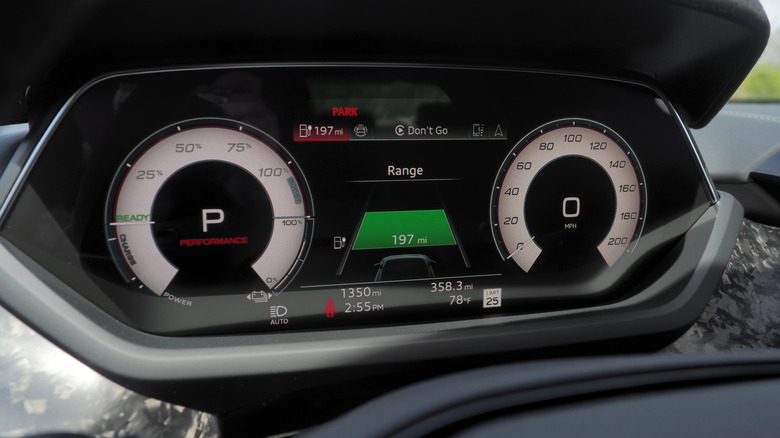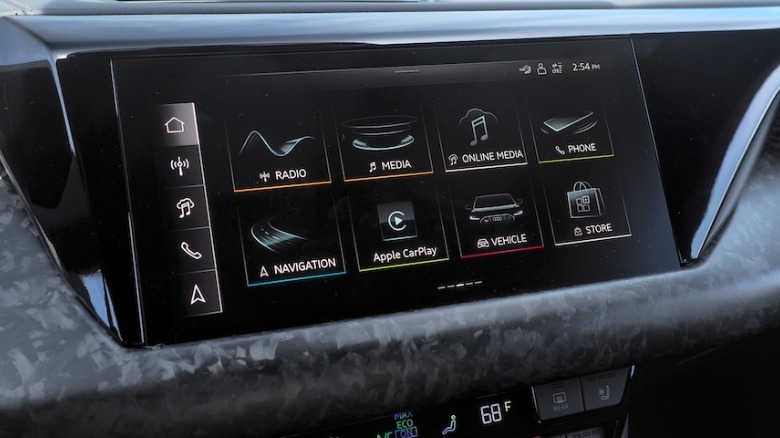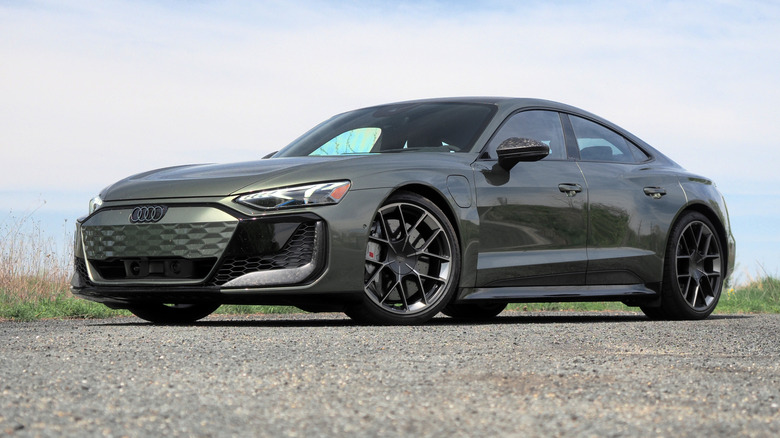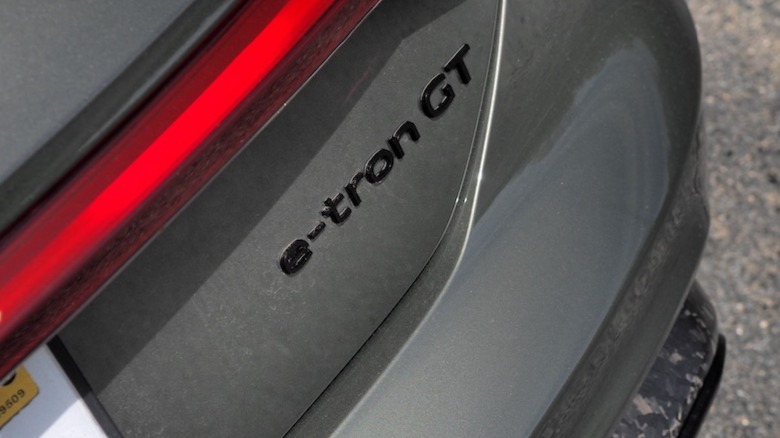2025 Audi RS E-Tron GT Performance Review: A Six-Figure Electric Speed Bargain
By the time you've said the full name of the 2025 Audi RS e-tron GT Performance out loud, the car itself could probably have hit 60 miles per hour and kept on pulling. With 912 horsepower in its Launch Mode, the sleek, smooth lines of this all-electric sedan represent not only a hefty dollop of German luxury — pricing starts at $167,000 (plus $1,295) — but Audi's refusal to opt out of the EV speed race. As you might expect from the four rings on the mostly-unperforated grille, mind, it's a different flavor of that race to what many rivals are offering.
In its Bedford Green metallic paint (a $595 option) the RS e-tron GT could almost look subtle, though the various carbon fiber lashings ensure that doesn't occur. 20-inch 5-spoke aero design wheels are standard, but the $8,400 Forged Carbon Package swaps them for 21-inch dark finish 6-double-spoke RS design versions. It also adds a dark carbon matte roof, plus various forged carbon exterior and interior trim pieces.
Audi's carbon blend is particularly dramatic, and while it's probably a love-it-or-hate-it affair, I think it's much more appealing than the traditional, overplayed carbon fiber weave. Of course, they're just a handful of the extras that took this particular example to $190,190 all-in.
It's a sports car that doesn't make you leave your friends at home
The $1,900 RS Performance Design Package swaps the standard seat upholstery for Nappa leather and Dinamica, with green stitching and matching seatbelts. There's more Dinamica — effectively faux-suede — on the doors, wheel, and center console.
It's not a bright cabin, not least because the single-piece roof lacks any sort of glass or sunroof insert, but it does at least feel different from other Audi models. The angular dashboard looks distinctive while still delivering plenty of physical controls.
In fact, the 10.1-inch touchscreen — with support for wireless Apple CarPlay and Android Auto — feels charmingly compact, though Audi pairs it with a virtual cockpit digital driver display. There's dedicated switchgear for the tri-zone climate control (and heated, cooled, and massaging front seats are standard) while the standard B&O audio system doesn't require cranking up to be thoroughly audible thanks to the dual-pane acoustic side glass.
Officially there's seating for five, though the center rear spot is — with its raised bolster and the RS e-tron GT's swooping roofline — snug for adults. Better to see this as a four-seat affair. The trunk is 9.2 cu-ft, a marked dip from something like the hatchback RS 7 which offers 24.6 cu-ft under its similarly curvaceous lines. The RS 7 doesn't have a front trunk. Rather, the EV uses that 1.8 cu-ft to store the charging cord.
When 670 horsepower just isn't enough
Clearly, someone at Audi decided it was no longer messing around when it came to electric power. While a "regular" 2025 S e-tron GT delivers "just" 670 horsepower, this RS e-tron GT Performance version packs a fairly mind-boggling 912 horses in its launch mode. For that, it doesn't even require three motors: just one up front and one — with a two-speed automatic transmission — at the rear, for Quattro all-wheel drive.
Weirdly, then, in Comfort or Efficiency mode, the fearsome four-door feels positively surreptitious. Sure, bury your right foot and it'll scoot away eagerly, but Audi is clearly taming the electric horses considerably. Even in Dynamic mode, it's swift but not ridiculous. You could almost start to be disappointed.
Then you engage RS mode, and things get silly.
0-60 mph arrives in a mere 2.4 seconds (versus 3.3 seconds for the non-RS version, which is still stupid-fast) a pace which is bordering on uncomfortable. At least, as the driver, you're braced and ready for it; passengers, even those excited about the prospect, changed their tune when a second run was offered.
No gas, just whoosh
Look, 2.4 seconds is wildly rapid acceleration. A McLaren 750S — a bonafide supercar, starting at around double the entry price for an Audi RS e-tron GT Performance — is quoted at 2.8 seconds 0-60 (though that's probably conservative). Lucid's Air Sapphire will do that dash to sixty in 1.89 seconds, sure, but it's also a quarter of a million dollars. Suddenly, the Audi starts to feel very nearly affordable.
Of course, long stretches of road begin to seem ominously small, when you're dealing with pace of that sort. Eventually you get to a corner, and there's where the Audi's suspension weighs in.
Adaptive air suspension is standard, capable of raising or lowering the RS e-tron GT according to drive mode or other conditions. The Dynamic Package — a hefty $11,000 alone — includes active damper control suspension and ceramic brakes, along with high-performance summer tires. Those special dampers individually adjust downward force at each wheel, for even stickier handling.
It can't quite forget Audi's commitment to comfort
The result is a ride that can be almost punishingly firm. Ideal, I'm sure, for the sort of near-perfect asphalt near Heilbronn, Germany where the EV is assembled, but the far shoddier surfaces in my Michigan stomping grounds were less accommodating.
Thankfully, the dedicated RS button on the steering wheel cycles through driver-customizable settings, so I could dial back the suspension stiffness without losing the rest of the drivetrain at its most potent. I suspect you'd need a race track to see the full impact of the active dampers, but the Audi remains flat and unruffled in just about all situations.
Interestingly, though, the RS e-tron GT Performance never felt like it was willing to give up on comfort entirely. I suspect engineers at Audi and Porsche — which offers a version of the trick dampers as Active Ride on cars like the all-electric Taycan — might have some fascinating behind-the-scenes discussion about just how aggressive their individual clientele would like their respective EVs to get.
Speedy electric rivals have more range
Even with a 105 kWh battery — of which 97 kWh is usable — the RS e-tron GT Performance is no range leader. 278 miles on a full charge is adequate, but a Taycan Turbo (which, with Active Ride, 21-inch wheels, and a few other extras, lands at almost exactly the same $190k as the Audi you see here) is rated for 292 miles. Or how about a Lucid Air Grand Touring, which will do 0-60 in three seconds, starts at $110k, but is rated at a whopping 446 miles on 21-inch wheels.
All of those numbers are merely aspirational, naturally, if you drive in earnest. At least when it comes to charging, the Audi supports up top 320 kW DC fast charging: find a suitably-potent station, and 18 minutes should take the EV from 10-80%. Figure on 12 hours for a full charge on a 40A home Level 2 charger.
A heat pump is fitted as standard, for improved battery performance in cold weather conditions. Niftily, Audi also provides charging ports on both sides (though only one supports DC fast charging). Less niftily, only one of them wanted to work with my home charger.
2025 Audi RS e-tron GT Performance Verdict
With the demise of the R8 — which took a (relatively) languid 2.8 seconds, in its swiftest configuration, to hit sixty miles per hour — it's clear the RS e-tron GT Performance snags the halo spot at the top of Audi's line-up. That it's an electric car which demonstrates the pinnacle of Audi quickness is no great surprise: while purists may bemoan the absence of exploding hydrocarbons, and the soundtrack that comes with it, EVs have convincingly settled the "which can be faster" question.
What's more interesting is the breadth of the RS e-tron GT Performance's pitch. Fast, certainly, but also cosseting and reasonably practical. Almost as if, having already proved it can build a bonafide sports car, Audi's next demonstration of "Vorsprung durch Technik" is to show just how little compromise need be involved in that.
Certainly, there are even faster EVs, and rivals with longer range, but Audi's pricing here — with the acknowledgment that any car commanding a six-figure sticker can't exactly be called cheap — is the wildcard. Placid when it needs to be, and with no shortage of punch when it's time for fun, you can't exactly fault Audi for being a little boastful about what it achieved with the RS e-tron GT Performance.

